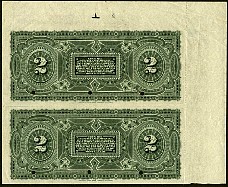|
||||
|
||||
 President: Louis-Félicité Lysius Salomon-jeune 2.10.1879 - 10.8.1888 |
|
||||
|
|
Ex. Rosenberg Collection |
|||
|
|
||||
|
|
Ex. Rosenberg Collection |
|||
|
|
||||
_jpg.jpg) N.776Sd47, P.78s X2 2 Gourdes SPECIMEN Series D47 (Unlisted) |
 Back |
|||
 N.776d22, P.78a 2 Gourdes Series D22 |
 Back |
|||
 N.776d49, P.78a 2 Gourdes D49 (Unlisted Series) CL1 |
 Back Early Short Snorter Signed by François Manigat |
|||
|
Louis-Félicité Lysius Salomon-jeaune was born in 1815 to an influential family in Castel Père, near Aux Cayes, south Haïti. The Salomon family were sworn enemies of Charles Rivière Hérard (President from 13 March 1843 to 3 May 1844). Hérard had twenty eight year old Lysius Salomon and his father arrested and exiled to Neyba. Salomon spent many years in exile abroad studying and preparing himself. When he returned the first time during Faustin Soulouque's Presidency (1 March 1847 to 15 Jan 1859) he was appointed Minister of Finance, a position he held for 11 years. He was subsequently appointed Minister of the Interior only to be exiled again. After spending a total of 28 years in exile Salomon returned to Haïti on 19 August 1879 and in three months won the Presidency. At age 64 the "Old Man" took office on 26 October 1879 and went on to be one of the most revered Haïtian presidents since Christophe. After assessing the financial situation of the country, on 30 November 1879, Salomon made a blunt speech to the nation announcing that Haïti's "credit was ruined" but he intended to fix it. Within a few months he drove through legislation to establish a new edition of the national bank, Banque Nationale d'Haïti (BNH), freshly capitalized by a consortium of 17 French bankers with 10 Million Francs. Salomon's years in exile in Paris and London were now bearing fruit. BNH began operation in 1880 and in the fall began issuing silver, bronze and copper coins, authorized by the law of 24 September 1880. Salomon's first paper currency issue occurred in 1880 (P.74) printed in France. The next issue was by ABNC in 1883, authorized by the law of 28 August 1883 with the third issue in 1884, seen above. The final Salomon issue was in 1887. Displaying tremendous vision, leadership and discipline, Salomon resumed payments to France of its long overdue loan of President Michel Domingue (12 June 1874 - 15 April 1876) as well as the 1825 "millstone" - Haïti agreed to pay France 100 Million Francs for war reparations in return for recognition of it's independence. France was also granted a 50% reduction in tarrifs. On 17 March 1825, under threat of naval bombardment, this amount was arbitrarily raised by Charles X to 150 Million Francs. To his great credit, by the end of his administration in 1888, Salomon had paid off the Domingue Loan as well initiating a diligent payment scheme to better handle the burdens of the 1825 millstone. The millstone is often mentioned by scholars as a major factor in Haïti's perpetual poverty. "The 1824 indemnity was refunded by French loans in 1875, 1896 and 1910, with Haïti maintaining a remarkable record of payment of this burdensome debt, never defaulting until the American intervention in 1915."3 In addition to the restoration of better fiscal management, Salomon is also credited with authorizing Haïti's first postage stamps issued in 1881, establishing a national archive, restoration of rural education, overhauling agriculture, government administration and the military. Unfortunately the national archive was destroyed in a fire along with an important law library brought in from France. In 1883 Salomon appointed one of his long time supporters, François Saint-Surin Manigat, as Minister of the Interior and later a Delegate to the BNH. Manigat's signature is seen above on the 2 Gourde of 6.10.1884. He was subsequently appointed as Minister of Education in 1887 and was a General in the Army before being exiled to France where he later died. Manigat's grandson, Leslie François Manigat, a historian and political scientist, became the 36th President of Haïti in 1988 in the first Presidential election in 30 years. Manigat, born 13 August 1930 in Port-au-Prince, studied in Paris on a scholarship in 1949 and returned to Haïti to become Director of Political Affairs at the Foreign Affairs Ministry. He founded the Institute for International Relations in 1958 at the request of President "Papa Doc" Duvalier. He later broke with the Duvalier regime in 1960 and was jailed. After being refused exit visas he sought asylum in the Argentine Embassy where he spent 18 months. In May 1963 he left for the USA on what became 23 years in exile. During this period he returned to Paris where he met his wife Mirlande Hippolyte and was married in 1970. In 1974 he left France for Trinidad and then to Caracas, Venezuela where he formed a center right political party in exile in 1979. Leslie Manigat made a valiant attempt to break from the past. His term was marred by protests initiated by the military. His Presidency lasted from 7 February 1988 until 20 June 1988 when he was overthrown by the military. President Salomon was driven out of office and on 10 August 1888 fled to France for the final time. He died in Paris on 19 October 1888 at the age of 73. In recent times he has become more appreciated for his outstanding contributions to the nation and in 1968 the government funded the writing of his biography. Salomon is commemorated on the modern 50 Gourde notes starting with P.204 continuing to the current 50 Gourde issues. |
|
Leslie
F. Manigat - Library of Congress
Link |
![]()